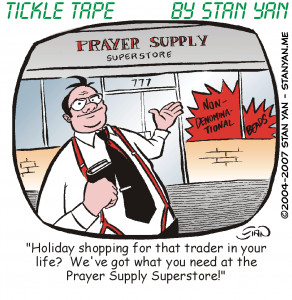One way to cultivate a winning mental edge is to have an accurate perception of what you can and cannot control. There’s a powerful human desire to believe that one can have complete control over one’s destiny. We all want to believe that if we try hard enough, we can account for, and defeat, every possible adverse event that may foil our plans. But in reality, there’s a lot we can’t control, and it’s useful to admit this fact.
As a trader, you make many independent decisions about which stocks or commodities to purchase, and because you put in a huge amount of concerted effort to make these decisions, you naturally want to believe that the hard work will pay off, that you’ve increased your odds of success. Psychologists call this phenomenon the “illusion of control.” Investment psychologist Dr Van K. Tharp calls it the “lotto bias.”
When many people play the lottery, they believe they have a pretty good chance of winning because they picked the winning numbers themselves. It’s as if the mere act of selecting numbers makes people believe they have increased their odds. But when playing the lottery, winning is a matter of pure chance, and it doesn’t really matter whether one made the effort to select the numbers themselves or whether the numbers were picked with a random number generator; the odds are relatively the same in both circumstances.
Although trading isn’t exactly like playing the lottery, there are times when enough adverse events go against you that you virtually have no chance of seeing a profit. In other words, there are many times when luck must be in your favour to make a profitable trade, regardless of the quality of your trading plan. Yet because you put in a sizeable effort to devise a well-formulated trading plan, you naturally tend to believe you have more control than you actually do. You want your effort to pay off. You believe you’ve increased your odds of success.
In reality, it’s impossible to know exactly how a trading plan will do once it is executed. Any trading plan is based on assumptions about market action at a particular point in time, and market participants may not act according to those assumptions. There’s a good chance that your trading plan may be foiled by adverse events or a change in market conditions that you could not possibly have anticipated or controlled. It’s useful to always keep this fact in mind. No matter how hard you try, no plan is foolproof. To survive, you must face the possibility that the market conditions at a given moment are just not conducive to your trading plan.
The fact that you can’t account for every possible set of circumstances that may thwart your efforts can be disheartening. But you needn’t focus on it too much. All you have to do is work around the issue. Be aware that no plan is foolproof and that you must take precautions to protect your interests. The best precautions are to have a clearly defined trading plan and to manage your risk. Just because you can’t actually conquer all possible adverse conditions doesn’t mean that you shouldn’t try. It’s vital that you try to consider all possible events that may ruin your trading plan.
It’s also essential to have clearly defined entry and exit strategies. Don’t leave any aspect of your plan unspecified. For example, if you identify beforehand what signals indicate that market conditions have gone awry and that you should exit, you will be able to survive the trade relatively unscathed. Of course, that’s only if you manage your risk. Since you can’t account for times when market conditions are skewed, you must limit the amount of capital you risk on a single trade. Doing so will allow you to survive the chaotic unpredictability of the markets.
As much as we want to fully control our destiny, it’s often impossible. Accepting what we can and cannot control is the best we can do. We can’t control the market. We have to go where the market takes us. What we can do, however, is take the necessary precautions to protect ourselves when market action goes against our plans. That means careful planning and managing risk. By taking precautions, you can preserve capital, benefit from those times when market conditions move in your favour, and achieve consistent profitability.


